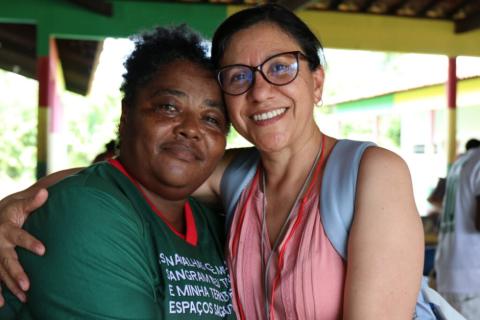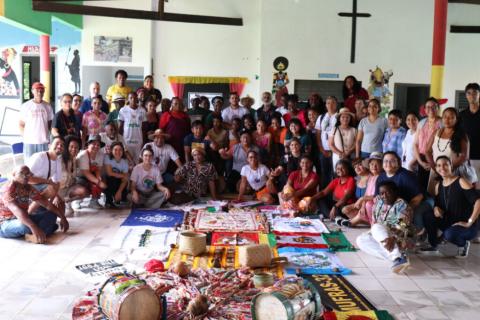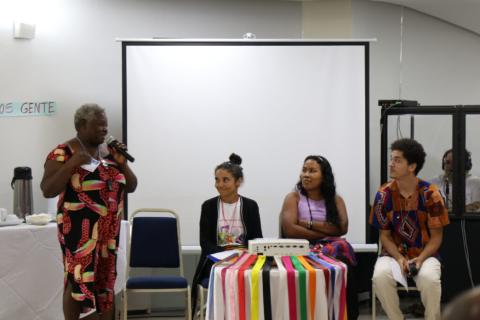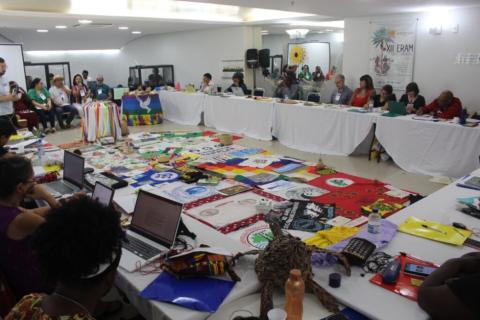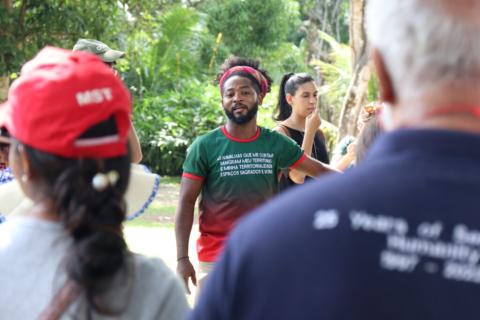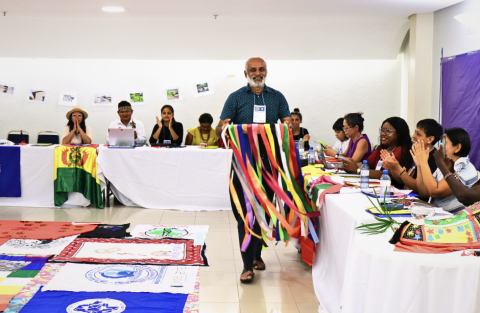
25 social movements come together in Brazil to promote common agendas
At a time when relentless attacks against human rights defenders often face impunity, and the far-right continues to increase its power in Latin America, social movements continue to lead initiatives for justice and rights advocacy.
Last January, we gathered 40 leaders from over 25 social movements across Latin America, the Caribbean, Asia, and Africa for our Regional Meeting of Social Movements in São Luis, Brazil. Justiça Nos Trilhos, a member of the network and a key organization in the fight against the extractivist development model in the state of Maranhão, co-organized the meeting.
ESCR-Net is guided by the principle of centrality in social movements. We value and deeply respect their leadership in the global struggle for economic, social, and environmental justice. Among our priorities is creating spaces where social movements in the network can unite to foster solidarity, share stories of their struggles, and delve into the collective analysis of their obstacles.
In preparation for the upcoming global strategy meeting in September, which will bring together the entire network membership in Thailand, members organized this preparatory meeting in Brazil to analyze the main challenges, deepen the shared analysis of the global conditions they face, and provide a space for exchange.
The conversation focused on Latin America and tackled critical issues like the right to self-determination, alternative economies challenging the neoliberal model, and the defense of territory. As part of the meeting, we visited the Santa Rosa dos Pretos community as part of a solidarity visit led by Justiça Nos Trilhos.
This event continues a series of meetings we started in Durban, South Africa, in January 2023, which brought together key members of the African region's movement. These events aim to provide a space for social movements to advance in consolidating a common agenda and reflect on the current situation of indigenous, Afro-descendant, workers, and peasant movements, land and territory defense, environmental protection, food sovereignty, the political economy of violence, the right to health and housing, the impact on women's lives, and the care economy.
Brazil's experience from the members' perspective
Note: This is an adaptation of the original text from Justiça nos Trilhos (JnT), written by journalist Yanna Duarte, which you can find here.
"A people who have not lost their identity and culture are a people who cannot be exterminated." This phrase from Francisco Rocael of the Council of the Maya People of the West (Guatemala) encapsulates the strength of social organizations, communities, and traditional peoples who participated in the Global Meeting of Social Movements convened by ESCR-Net in São Luís (Maranhão, Brazil) from January 29 to February 2, 2024.
The meeting, coordinated by ESCR-Net in partnership with Justiça nos Trilhos (JnT), brought together over 40 artisanal fishermen, quilombolas, indigenous people, domestic workers, and unions from Kenya, the Philippines, Mexico, Colombia, Brazil, the USA, Argentina, Sri Lanka, South Africa, Guatemala, Peru, Ecuador, Bolivia, and El Salvador who shared experiences with organizations from Brazil, such as the Landless Rural Workers Movement (MST), the Movement of People Affected by Dams (MAB), and the Union of Black Rural Communities of Itapecuru Mirim (Unicquita).
The meeting aimed to exchange experiences among representatives of different struggles and movements facing corporate power in various contexts. Participants also learned about the experiences of different civil organizations in Brazil that defend rights violated by transnational mining and large Brazilian companies and participate in resistance processes against violence and poverty linked to the advance of imperialism.
"Without territory, people are nothing": the struggle of Santa Rosa dos Pretos and other experiences from Brazil
Visit to the quilombola territory of Santa Rosa dos Pretos. Photo: Mikaell Carvalho
On Tuesday, January 30, we visited the quilombola community of Santa Rosa dos Pretos, located in the municipality of Itapecuru Mirim (MA). This community faces the development of mining energy projects, the duplication of the BR-135 highway, and the advance of agribusiness in its territory.
The development discourse promoted by agribusiness and mining projects is based on confiscating traditional territories and devastation of ecosystems. During the visit to the Santa Rosa dos Pretos community, which is still undergoing the titling process by Incra—the federal agency responsible for regularizing quilombola lands—the right to land was positioned as one of Brazil's main axes of the class struggle.
"All this aggression they do against us is done in a very hypocritical way in the name of false development. They are mining projects, companies, monocultures," said Francisco Rocael, sharing the realities of the community.
Daniel Santi, leader of the Sarayaku indigenous people of the Ecuadorian Amazon, spoke about the importance of staying in the territory. "We must have the strength of unity. We must work on territorial titling in the legal strategy, guide agrarian reform. We must have a strategy of struggle and communication on a Brazilian and international scale. We need to internationalize [this network] so that the struggle of Santa Rosa dos Pretos is heard in other countries."
For Santi, "without territory, people are nothing." Water, soil, natural resources - all of these constitute the territory of traditional peoples. Forests and animals are also inhabitants. During the conversation, quilombola and popular educator from Justiça nos Trilhos (JnT), Joércio Pires, explained how supposed development affects communities.
"When the Carajás railroad (EFC) passed [over us], it killed many things. There was no longer a stream, we no longer had access to fish, so we had to buy it. And we were in another process [of life]," he denounced.
Fortalecimiento de la comunidad
Justiça nos Trilhos (JnT) originated from the territories. It originates in Piquiá de Baixo, in the Indigenous Land of Rio Pindaré, in the quilombo of Santa Rosa dos Pretos, and other communities throughout the EFC. It feeds the strengthening of memory and builds resistance among peoples and communities that will break violence.
For popular educator and human rights defender Alaíde Abreu, the role of community strengthening in the organization, one of the four action axes of the institution, is carried out with eyes and senses directed towards others.
Our work comes from "belonging to the territory and people's lives, the sensitivity to see, listen, and feel what people feel and experience. Support the struggles, embrace reality... From this point, we will think together, as actors subject to our interventions, mechanisms to change reality," she describes.
Piquiá de Baixo, Novo Oriente, and Rio Pindaré Indigenous Land share during the event.
Kelly presented the case of the Piquiá de Baixo community in Açailândia (MA), which works for the defense of the rights to memory, housing, and nature. In 2024, 312 families will be resettled in a new neighborhood called "Piquiá da Conquista," away from the direct pollution of steel mills, cement plants, and other mining-related activities.
Piquiá de Baixo, Novo Oriente, and Rio Pindaré Indigenous Land are united. In addition to having great strength to resist large extractivist projects, these three women have their bodies marked by violence that, unfortunately, are connected to each other. Vanussa Guajajara recalls that her people used to enjoy eating smoked fish, fishing in the rivers, listening to stories in circles, but then came mining and roads, the railroad, and the BR-135, lives taken by large trucks transporting soy and minerals on the BR-135, and also the criminalization of leaders by the mining company Vale SA.
"This violence began, and instead of eating roasted Jabuti with flour, we have to work together to defend our territories and stay united," says Vanussa.
These are some of the moments recorded during the meeting:
Fotos: Mikaell Carvalho
Organizations and social movements gathered on the first day of ESCR-Net activities. Photo: Yanna Duarte
Popular educator Joércio Pires talks about the struggles within the community.

